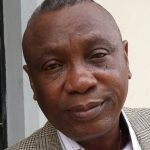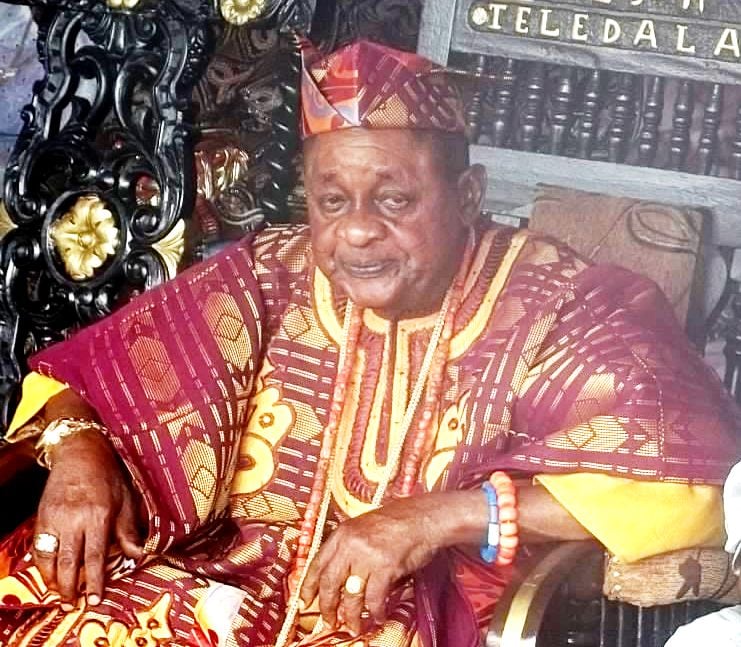The drums will roll out on Thursday January 14 on the golden anniversary of the coronation of the Alaafin of Oyo, IKU BABA YEYE, IGBA KEJI ORISA, Oba Lamidi Olayiwola Adeyemi III (82). I am sure the Iya Ilu- the traditional drum and the Shekere will be sounded on that day. If his empire has not disintegrated,there will be celebrations on that day in Awe, Moniya, Igboho, Iponri, Fiditi, Ayete, Ado Awoye, Jabele, Shaki, Shapetin, Ikoyi, Ede, Ejigbo, Abugaga, Ipapo. Ajuwa, Igbeti, Igbo Ora, Ajegunle, Lanlate, Offa Meta, Kosobo, Ogbomoso, Iwo and other surrounding towns in Oyo. Expected at the event is the vice president, Professor Yemi Osinbajo, who will represent president Muhammadu Buhari GCFR.
The Minister of Information and Culture, Alhaji Lai Mohammed will be there too Also expected is the man who made the coronation possible fifty years ago, Dr. Victor Omololu Olunloyo (85), who was the Commissioner for Chieftaincy and local government Affairs in the old western state.My friend chief Lekan Alabi ,who was 70 recently , told me on phone , that the Alaaafin is planning big for the golden anniversary. Till the 70 S the Alaaafin had a palace at Oke Aremo in Ibadan.
AJI SE BI OYO LA RI, OYO O SE BI ENI KO KAN which translates you can only be like Oyo, Oyo cannot be like you.
The Oyo Empire grew to become the largest Yoruba state. It rose through the outstanding organizational and administrative skills of the Yoruba people, wealth gained from trade and its powerful cavalry. The Oyo Empire was one of the most politically important states in the entirety of Western Africa from the mid-7th to the late 18th century, holding sway not only over most of the other kingdoms in Yorubaland, The collapse of the Oyo empire is still the worst tragedy that has befallen the Yoruba people till today. If the empire has not disintegrated, there would have been no need for the amalgamation of 1914. The British would have met an empire and negotiated with the people of that empire of same national identity, same national consciousness, same culture and same lifestyle. There would not have been clamour for restructuring. It is argued today that the amalgamation is like a curse now. A union that has become damnable. A nuptial facing possible divorce.
No Alaafin in modern times has celebrated 50 years on the throne. The nearest was Alaafin Siyanbola Onikepe Oladigbolu who reigned from 1911 to 1944 while Alaafin Adeniran Adeyemi II only ruled from 1945-1955. Alaafin Atobatele Atugba ruled from 1837-1859. Alaafin Aloworodu Adeyemi ruled from 1876 to 1905. In modern times, the shortest reign was Alaafin Amodo who only reigned from 1833 -1835. Alaafin Adeyemi III has been very fortunate. Oyo has witnessed a lot of growth during his reign.The Alaaafin was given his staff of office on that sunny Thursday January 14. 1971 in Oyo by the the military Governor of Western state Brigadier Robert Adeyinka Adebayo (March 8 1928 – march 9 2017).
Advertisement
He has seen the entrance and exit of 21governors namely Major General Adeyinka Adebayo (August 1966- April 1971), Brigadier General Christopher Oluwole Rotimi (April 1 -1971 –July 975), Admiral Akintunde Akinyooye Aduwo (July 1975-August 1975), Col. David Medayese Jemibewon (March 1976-July 1978), Col. Paul Tarfa (July 1978-October 1979), Chief Bola Ige (1 October 1979-1 October 1983), Dr. Victor Omololu Olunloyo(1 October 1983-31 December 1983), Lt. Col. Oladayo Popoola (4 January 1984-September 1985),Col. Adetunji Idowu Olurin (September 1985-July 1988), Col. Sasaenia Oresanya (27 July 1988-August 1990), Col. Abdulkareem Adisa (September 1990-January 1992), Chief Kolapo Olawuyi Ishola (2 January 1992-17 November 1993, Navy Capt. Adetoye Oyetola Sode (9 December 1993 -14 September 1994), Col. Chinyere Ike Nwosu (14 Sep 1994-22 Aug 1996), Col. Ahmed Usman (22 August 1996-August 1998), Comm. Pol. Amen Edore Oyakhire (16 August 1998-28 May 1999), Dr. Lam Adesina (29 May 1999-28 May 2003, Rashidi Adewolu Ladoja (29 May 2003-28 May 2007),Impeached in January 2006, reinstated in December 2006, Chief Christopher Alao-Akala(12 January 2006 -(29 May 2007-29 May 2011), Chief Abiola Ajimobi (29 May 2011-29 May 2019), Oluseyi Abiodun Makinde (29 May 2019, Incumbent. In fact the present governor of Oyo state, Oluseyi Makinde was four years old when Oba Lamidi Adeyemi ascended the throne on January 14, 1971.
There are other Yoruba Obas who are warming up to celebrate their golden anniversary on the throne too .The Elejigbo of Ejigbo, Oba Omowonuola Oyeyode Oyesosin (84) will celebrate his golden year on January 19, 2024. The Elejigbo reminds me of some of his friends who were members of the installation committee when he ascended the throne on January 25, 1974, I am thinking of Lateef Abbas, Chief Akanni Aluko, Alhaji Arisekola Alao, Mr Tayo Kehinde, Olu Makinde , Biodun Famojuro, Egbon Tunde Akingbade, Chief Adeseun Ogundoyin . It was a colourful day in Ejigbo that day. I was present at the installation that day in Ejigbo. King Sunny Ade entertained the guests. He later recorded an album in his honour. The paramount ruler of Idanre, Oba Federick Adegunle Aroloye Arubuefin IV, will celebrate his forty-five years on the throne on September 8 2021. On September 8 2026, he will celebrate 50 years on the throne. Idanre has more than 150 villages. The paramount ruler of Ijesha land, Oba Gabriel Adekunle Aromolaran II,Owa Obokun Adimula, was crowned on February 20, 1980. He celebrated his forty years on the throne last February. The Soun of Ogbomoso, Oba Oladunni Oyewunmi Ajadungbade III, born on May 27, 1926 will celebrate his fifty years on the throne on December 14, 2023. His best friend was Justice Samuel Obakayode Eso (1925-2012) from Ilesha, who was a justice of the Supreme Court. My friend, Dotun Oyelade has written so much about Oba Oyewunmi. Ogbomoso is the second biggest town in Oyo state. The paramount ruler of Badagry, Oba Babatunde Akran, the Whenu Aholu Menu Toyi has just celebrated his forty-two years on the throne. By 2027, he will celebrate his golden anniversary.
The Ewi of Ado Ekiti, Oba Rufus Adeyemo Adejugbe Aladesanmi III recently celebrated his thirty years anniversary on the throne. How time flies. I signed the press release which conveyed the approval of governor of Ondo state then ,Sunday abiodun Olukoya which made him the Ewi of Ado Ekiti I also signed the press releases which also conveyed the approval of the governor of Ondo State Rear Admiral Sunday Abiodun olukoya for the appointments of the following as Obas. The Ajero of Ijero Oba Adebayo Joseph Adewole Arojojojoye who was crowned on December 16 1991. The Deji of Akure Oba Atayese Adebobajo Adesida who reigned in Akure between 1999 – 2005. Oba Festus Ibidapo Adesanoye who reigned in Ondo Kingdom as Osemawe between 1991 till he died in 2006. It was about the same time that Governor Bode George of Ondo state approved the nomination of Oba Yesufu Adebori Adeleye as the Olubaka of Oka who ascended the throne on April 16, 1988. The nominations of the traditional rulers were presented to the Ondo state Executive Council by the then Commissioner for Local Government and Chieftaincy Affairs, Professor Gabriel Isola Olomola from Ado Ekiti.
Advertisement
Mention must be made of Oba Adedokun Omoniyi Abolarin, Orangun of Oke Ila, who personally built a college for his community in Oke Ila, Ifedayo Local Government Area of Osun state. He was born on September 4, 1958 and was crowned in October 2006. I cannot forget Oba Femi Ogunleye, the Towulade of Akinale near Abeokuta, a Journalist/legal practitioner, who personally built a school in his community too.
The Alaafin has now joined the league of traditional rulers who have reigned more than fifty years or near fifty years. Notable among them is Oba Sikiru Kayode Adetona, the Awuyale of Ijebuland, who was born on May 10, 1934. He was crowned on Saturday, April 2, 1960. He became a member of he western region house of chiefs on April 5, 1960. A friend of mine, Dr Fasi Yusuf has written so much about the Awujale. He is a living legend. I saw his son, Prince Adedire at Festac in Lagos recently when my friend Otunba Gbenga Tiamiyu from Iperu turned seventy. Oba Rufus Adekolurejo Aderele was the Osemawe of Ondo from 1942 to 1974 He was Osemawe for 32 years
Oba Daniel Akomolafe Anirare Aladesanmi ruled from 1937-1983 as the Ewi of Ado Ekiti. His reign was the longest in Ado Ekiti in modern times.Till today he is still loved in Ado ekiti. The Akarigbo of Remo, Oba Moses Sowemimo Awolesi, Erinwole II, reigned from 1952 to 1988.
The late Attah of Igala in Kogi state, His royal majesty Aliyu Ocheju Obaje (1920-2012) ruled for 56 years. Oba Okunade Sijuade Olubushe was the Oooni of Ife from 1980 till he died in 2015 . Oba Adetula Oyinyo Adeleye (1928-2012), CFR, the Elekole of Egbe Oba was crowned on June 2, 1953 and died on the throne on October 2 2010. He was father in-law to Senators Ayo Arise and Dayo Adeyeye the minister of state for works under President Goodluck Jonathan GCFR
Advertisement
The Akarigbo of Remo, Oba William Christopher Adedoyin reigned in Shagamu between 1916-1952.
Alhaji ) Ado Bayero was the Emir of Kano from 1963 to 2014. Alhaji Ado Bayero was born on 25 July 1930 into the royal family of the Fulani Sullubawa clan that has ruled over the Emirate of Kano since 1819. His father was Abdullahi Bayero and mother Hajiya Hasiya. He was the eleventh child of his father and the second of his mother. At the age of seven, he was sent to live with Maikano Zagi. His father reigned for 27 years. Muhammadu Sanusi I who was Ado Bayero’s half brother ruled after their father from 1953 to 1963. Following his dethronement in 1963, Muhammadu Inuwa ascended the throne for three months.
If we are to combine his years in exile plus his two reigns then the late of Olowo of Owo, Sir Olateru Olagbegi II (Augus 1910-1998), should have ruled for fifty- seven years. He was appointed the Olowo in 1941 and ruled for twenty five years before he was deposed in 1966. In 1993, his crowned was restored to him until he died in 1998. Some of his children Wale, Gbenle, Jare ,Yemi,Suyi are my personal friends. in the 60s ,He was the most powerful ruler in Owo division of Ondo province which now constitute 6 local governments of Ondo State 4 akoko local governments ,Owo local government and Ose local government. The olukare of Ikare Oba Akadiri Saliu Momoh has been on the throne since 1984. Similarly the Owa Ale also of Ikare Samuel Lolapo Adedoyin who, died recently ,was on the throne for 48 years The Alake of Egbaland Oba Samuel Mofolounsho Lipede reigned from 1972 to2005 .
The late Olu of Warri, D. Eyeolusan Joao Akengbuwa ruled from 1795 to 1848. He was the longest reigning monarch in Itsekiri land followed by Erejuwa II Wilson Ayoronmitsi Gbesimi Emiko who ruled from 1951 to 1986, and followed also by Olu Atuwatse II Godwin Toritseju Emiko who ruled from May 2 1987 to September 5, 2015.
Oba Sir Titus Martins Adesoji Tadeniawo Aderemi, Atobatele I, (15 November 1889 – 3 July 1980) was the Ooni of Ife from 1930 until 1980. He served as the governor of Western Region, Nigeria between 1960 and 1962. Sir Adesoji Aderemi was known as a wealthy man and had a large family of many wives and children. The first Otaru of Auchi in Edo state, Ikelebe the first, ruled from 1819 to 1861. Auchi is the second largest city in Edo state after Benin City. Auchi is the headquarters of Etsako West Local Government. During the British colonial rule, it was the headquarters of the kukuruku Division, the administrative headquarters of five districts. Auchi is also the root of one of the Momoh family. Iit is the home of Auchi Polytechnic.
Mention must be made of Olubadan of Ibadan, Oba Isaac Akinyele (1880-1965), he was the first Christian to be the Olubadan. He reigned for only ten years but laid a formidable reputation when died on May 1965. Sir Siddiq Abubakar III (1903-1988), was traditional ruler (Sultan) of Sokoto. He was born at Dange, some 60km from Sokoto, on 15 March 1903, the same day on which the British finally subdued the Sokoto Caliphate. Siddiq Abubakar III was the son of Usman Shehu, an eminent personality whose father, Mu’azu, was the Sultan of Sokoto (1877-1881) and a direct descendant of Usman Dan Fodio who founded the Caliphate in 1809. Siddiq Abubakar III had an Islamic education; he attended the local Koranic schools and held several administrative posts before succeeding his uncle, Hassan Ibn Mu’azu as the Sultan of Sokoto at the age of 35. He first came to Sultan Hassan’s attention when he was a district scribe, and in 1931 he was appointed a local authority councilor of the Sokoto Native Administration. Later, as head of Talata Mafara, a most important district which included the commercial town of Gusau, he distinguished himself by his administrative competence and the able way he dealt with appeals from traditional courts and supervised districts and village heads. In recognition of his ability and usefulness to the emirates.He was the Sultan of Sokoto between 1938 till November 1988. He was succeeded by sultan Ibrahim Dasuki who reigned from 1988 till 1996 The present Sultan Saadu Mohammed abubakar is the son of sir Sddik Abubakar .
His Highness Alhaji Umaru Sanda Ndayanko(1937-2002) the late Etsu Nupe was Permanent Secretary in Kaduna in 1964. He ascended the throne in 1975 and was nominated as a member of the Constituent assembly in 1976. When he died in 2003 his people mourned his passage, for the development he brought to his kingdom.
Advertisement
The late Jaja Amanyanbo of Opobo, Chief Douglas Jaja (1915-1980), son of Chief Arthur Mac Pepple Jaja (1872-1936) ruled for 60 years although he renounced his chieftaincy temporarily between 1943-1951 to get involved in politics. At the time of his death in 1980, he was much loved by his people. The late of Oba of Benin, Oba Uku Akpolokpolo Akenzua II (1899-1978), son of Oba Eweka II born as Edokparhogbuyunmun ruled for 44 years following the death of his father in 1934. In 1925, he served under the supervision of the late Alake of Egbaland, Oba Ademola in his palace.
Sir Oladipo Samuel Ademola (1872-1962) was crowned the Alake of Egbaland on September27, 1920, to succeed Oba Gbadebo who died on May 28, 1920. At the crowning ceremony, over 70,000 people were present, including a representative of the Queen of England. He ruled for 22 years. One of his sons Justice Adetokunbo Ademola eventually became the first Chief Justice of Nigeria. In 1948, Prince Adeyinka Oyekan challenged Prince Adeniji Adele (1893-1964) to the throne of Lagos. The Oracle told the two of them that they both will be Kings. Eventually Oba Adele ruled from 1949-1964 while Oba Adeyinka Oyekan II (June 30, 1911-March 1, 2003) ruled Lagos for 38 years making him the second longest ruling monarch in Lagos. The first being Oba Akinsemoyin who ruled from 1704-1749 for 45 years. Oba Suleiman Durotoye Abegunde(1907-1993) ruled Omuaran in Kwara State from 1945 to 1993, while the late Olofa of Offa also in Kwara State, Oba Mustapha Olawore Olaonipekun, who died in 2010, ruled for over 40 years. The late Ataoja of Oshogbo, Oba Iyiola Oyewale Matanmi, who was crowned on July 7, 1976 and died in August 2010, ruled for 34 years. It was during his reign that Osogbo was made the Capital of Osun State.
Advertisement
Alhaji Muhammadu Dikko (1885-1904) was the 9th Emir of Katsina between 1906-1944. He ruled for 38 years. He was succeeded by his son, Alhaji Usman Nagogo (1905-1981) who also ruled for 37 years. He was the father of late Major-General Hassan Usman Katsina, the first Military Governor of Northern Nigeria. The Sarkin of Gobir, Alhaji Muhammadu Bara reigned from 1975 to 2004, and ruled for 29 years.
The late Lamido of Adamawa, Alhaji Bankindo Mustapha was on the throne for 59 years before he died on March 13, 2010. His son Muhammadu Aliyu Bankindo Mustapha succeeded him on March 18, 2010. The late Owa of Idanre in Ondo State, Oba Adegbule Aroloye Arubefin III reigned from 1919 to 1969 for 50 years and died at the age of 120 years, making him one of the oldest monarchs in Nigeria.
Advertisement
Oba Afunbiowo Ojijiogungara Adesida ruled Oyemekun kingdom of Akure between 1897 and 1957 for 60 years. His beloved Olori (wife) is believed to have come from Idanre.He was the father of my friend Oba Adebiyi Adegboye Adesida husband of Oloori Moji Adesida who reigned as Deji of Akure between august 2010 and november 2013 .
The late Obi of Onisha, Ofala Okecukwu Okagbue reigned between 1970 and 2001 while Samuel Okosi reigned between 1901 and 1931. As the Alaaafin Adeyemi celebrates his golden anniversary it is necessary to attempt to analyse why the great Oyo empire collapsed.
The Oyo Empire is still very important to the Yorubas till today. The empire reminds the Yorubas of when they were masters of their destiny under one rulership, The Empire stretched from the present Kwara state to Western Nigeria up to Dahomey, which we now refer to as the Republic of Benin. By the middle of the 19th century, that empire had disintegrated and on its ruins rose the successor states of Ibadan, Abeokuta, Ijaye, Ogbomoso, Egba, Ijebu, Egbado, Ekiti, and New Oyo. Ilorin, though made up of Yoruba people, was now a Fulani kingdom or emirate. The first three—Ibadan, Abeokuta and Ijaye were the leading Yoruba states and their rivalry for supremacy formed one of the main topics of Yoruba history in the 19th century according to k B C Onwubiko.
Advertisement
The collapse of the Oyo empire in the 19th century was brought about by several factors – some internal and others external. One of the internal factors was an inherent weakness arising from the size and nature of the empire. Like the Sudanese empires of Mali, Songhai and El Kanem-Bornu, the Oyo Empire was quite extensive and this made central control of the provinces difficult. One reason for this was that Oyo the capital was situated on the northern fringes of the empire and this made it difficult for-the empire to control effectively the provinces most of which lay to the south of the empire. Again the system of administering the provinces through the Ilaris or resident provincial governors began to prove ineffective from the late 18th and early 19th centuries. These governors were not strictly supervised from the centre. Consequently they became oppressive, corrupt and arrogant and by their actions drove the subject peoples of the provinces to rebel against them and the Alaafin whom they represented. But the main factor for the decline and eventual collapse of the Oyo Empire was the weakness and resultant breakdown of the central government. This was the result of a constitutional crisis which rose from the struggle for power between the Alaafin and the bashoruns in the second half of the 18th century. This crisis reached its climax during the period 1754-1774 when the notorious Bashrun Gaha was in power in old Oyo. An unscrupulous power-monger, he craftily seized power, raised five Alaafins (four of whom he destroyed) to the throne and ruled despotically thereby upsetting the delicate balance of the Oyo constitution. It was Alafin Abiodun (1774-89) who arrested the situation temporarily by destroying Gaha and his family. But after his death in 1789, chaos again overtook the empire. Aole, the successor of
Abiodun, committed a constitutional outrage by ordering his army against Apomu, an Ife town. The army refused this order because Ife was sacred to the Yoruba and the Oni of Ife refused to consecrate new Alafins. The Obas alienated by this sacrilege withdrew their allegiance to the Alaafins and began to defy them and to assert their independence. And because of the political instability and unrest resulting from the constitutional breakdown, the central government could no longer regain effective control of the provinces. The situation was made worse by the fact that there was at this time no strong central army to crush the rebellions as was the case in the past. The Oyo army which was the chief instrument for the expansion of the empire and the suppression of internal revolts “was now a ghost of its former self.” This is evident from the fact that Oyo could not reconquer the Egba, and its army was soundly defeated by the Borgu in 1783 and the Nupe in 1791. The Oyo Empire therefore entered the 19th century with a serious constitutional crisis and a weak army. It is not therefore surprising that Afonja took advantage of the situation to carve out Ilorin as a kingdom for himself in 1817; and Dahomey a vassal state of Oyo effected its independence in 1821. From then on, Dahomey carried war into Yorubaland, and these wars aggravated the already confused political situation in Yorubaland and contributed significantly to the collapse of the Oyo Empire.
The destructive effects of these internal factors were no accentuated by a certain external factor, namely the Fulani with its concomitant effects on the Oyo Empire. The Fulani having conquered Hausaland and Nupe in the first decade 19th century were eager to expand southwards into Yorubaland. Then from Ilorin the Fulani began military pressure on northern Yorubaland, sacking Oyo in 1837. The population of Old Oyo was forced to flee one hundred miles to Ago-Oja where they founded New Oyo. This movement from Old Oyo to New Oyo effectively marked the end of the Oyo Empire. The Fulani pressure on the northern Yoruba states resulted in a southward population movement generated most of the Yoruba civil wars that plagued Yorubaland throughout the 19th century and completed the disintegration of the Oyo Empire. The authority on Yoruba history Professor Jacob Festus Adeniyi Ajayi ( may 1929 – 2014) from Ikole Ekiti wrote . “The Fulani conquest of Ilorin, had been the last and decisive blow that led to the dissolution of the Old Oyo Empire and the consequent Yoruba wars.”
Wishing the Alaaafin happy celebrations
Views expressed by contributors are strictly personal and not of TheCable.
Add a comment







